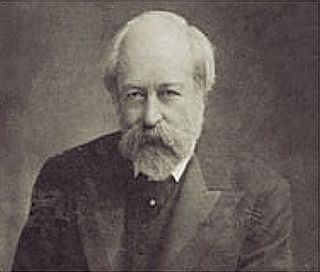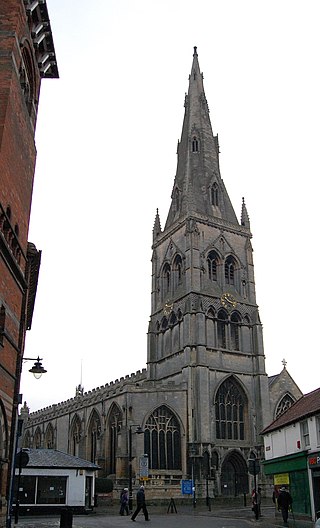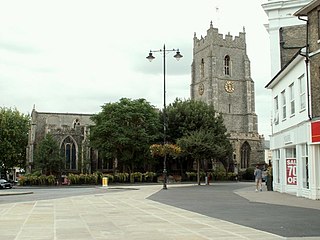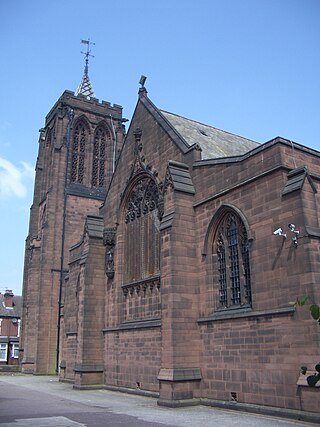
George Frederick Bodley was an English Gothic Revival architect. He was a pupil of Sir George Gilbert Scott, and worked in partnership with Thomas Garner for much of his career. He was one of the founders of Watts & Co.

The Church of St Agnes and St Pancras is in Ullet Road, Toxteth Park, Liverpool, England. It is recorded in the National Heritage List for England as a designated Grade I listed building, and is an active Anglican church in the diocese of Liverpool, the archdeaconry of Liverpool and the deanery of Toxteth and Wavertree. Pevsner described it as "by far the most beautiful Victorian church of Liverpool...an epitome of Late Victorian nobility in church design".

St Michael's Church is a Church of England parish church in St Albans, Hertfordshire, England. Much of the building is late 10th or early 11th century, making it the most significant surviving Anglo-Saxon building in the county. It is located near the centre of the site of Roman Verulamium to the west of the modern city.

All Saints Hove is an Anglican church in Hove, part of the English city of Brighton and Hove. It has served as the parish church for the whole of Hove since 1892, and stands in a prominent location at a major crossroads in central Hove.

All Saints is a Church of England parish church situated in Burton upon Trent. It is part of the Diocese of Lichfield.

St Modwen's is a Church of England parish church situated in Burton upon Trent in Staffordshire, England. It is part of the Diocese of Lichfield. The church is dedicated to St Modwen, or Modwenna, a nun who founded an abbey at Burton in the 7th century.

St Mary Magdalene Church, Newark-on-Trent is the parish church of Newark-on-Trent in Nottinghamshire, England. It is dedicated to Mary Magdalene and is the tallest structure in the town.

Calvary Episcopal Church is a parish of the Episcopal Diocese of Pittsburgh, Pennsylvania. The parish was founded in 1855.

St Paul's Church, Colwyn Bay is an active Anglican parish church in the town of Colwyn Bay, Wales. It is located in the deanery of Rhos, the archdeaconry of St Asaph, and the Diocese of St Asaph. The church is designated by Cadw as a Grade II* listed building.

Christ Church is a parish church in Lichfield, Staffordshire in the United Kingdom. The church is situated in Leamonsley in the south west area of the city. The church is of Anglican denomination and serves a parish made up of Leamonsley, Sandfields and Lower Sandford Street areas of the city.

St Peter'sChurch, Sudbury is a former Anglican church in the town of Sudbury, Suffolk, England, which now serves as an Arts Centre. The building is recorded in the National Heritage List for England as a designated Grade I listed building, and is under the care of the Churches Conservation Trust. The building stands in the heart of the town in a dominating position on Market Hill.

St Mary's Church is in the town of Windermere, Cumbria, England. It is an active Anglican parish church in the deanery of Windermere, the archdeaconry of Westmorland and Furness, and the diocese of Carlisle. Its benefice is united with that of St Martin's Church, Bowness-on-Windermere; St Anne's Church, Ings; St Cuthbert's Church, Kentmere; St James' Church, Staveley and Jesus Church, Troutbeck. The church is recorded in the National Heritage List for England as a designated Grade II listed building.

The Church of St Michael and All Angels is a parish church and Grade I listed building in the village of Hamstall Ridware, Staffordshire. The church is situated in a remote position to the north of the village accessed by a 250 m (820 ft) pathway through pasture land. The church is situated on a gentle slope 160 m (520 ft) west of the River Blithe. The church was founded in 1130—1150 but the majority of the present church was built of ashlar sandstone in the 14th and 15th centuries.

The Church of St Andrew is a Grade I listed church in the village of Clifton Campville, Staffordshire. It was built in the 13th and 14th centuries. The tall spire is a notable feature, visible from a great distance.

The Church of St James is the parish church for the village of Kingston, located on the Isle of Purbeck in Dorset. The church is a notable example of the Gothic Revival style and is a Grade I listed building.

St Joseph's Church is in York Road, Birkdale, Southport, Sefton, Merseyside, England, and is an active Roman Catholic church in the diocese of Liverpool. It was designed by E. W. Pugin, and built in 1865–67 with an aisle added in 1875. The church is recorded in the National Heritage List for England as a designated Grade II listed building.

The Church of St Teresa of Avila in Everton Road, Birkdale, Southport, Sefton, Merseyside, England, is an active Roman Catholic church in the diocese of Liverpool. It was built in 1897–98 and designed by the architectural partnership of James Sinnott, Bernard Sinnott & Daniel Powell. The church, together with its attached presbytery, is recorded in the National Heritage List for England as a designated Grade II listed building.

Holy Trinity Church in Eccleshall, Staffordshire, England, is a Grade I listed Anglican church.

The Church of St John the Evangelist is a Church of England church in Clevedon, Somerset, England. Designed by William Butterfield, it was built in 1876–78 at the expense of Sir Arthur Elton and has been a Grade II* listed building since 1976.






















